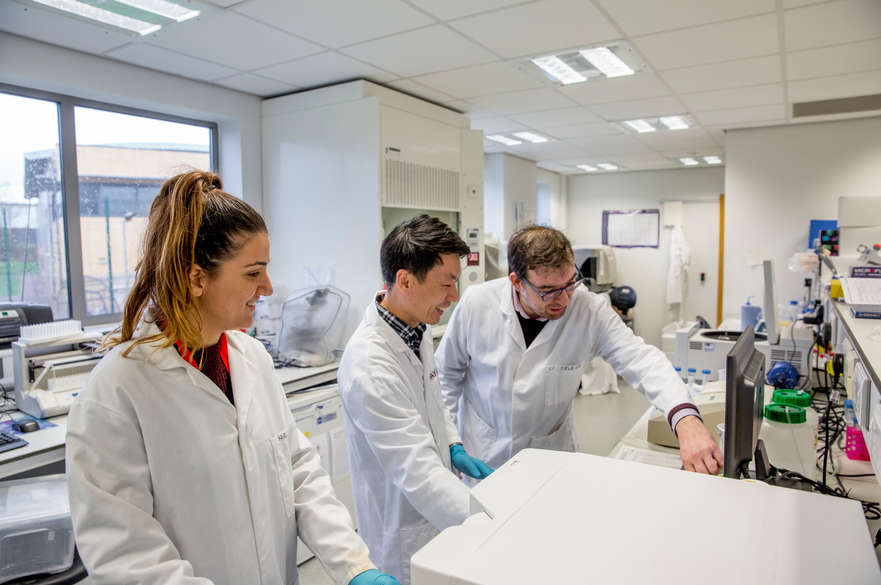The University Research & Innovation Committee (UR&IC)
The University Research & Innovation Committee (UR&IC) reports to the Academic Board and is chaired by the Pro Vice-Chancellor - Research and Innovation. The Committee has overall responsibility for the development and monitoring of research governance and procedures. You can find out more about the Committee’s terms of reference and membership below.
The powers delegated by Academic Board to the University Research and Innovation Committee (UR&IC) are defined and exercised according to a set of clear terms of reference, an appropriate constitution and to regular reporting to Academic Board. The terms of reference are as follows:
a. To oversee and support the development of high-quality sustainable research, knowledge exchange and practice related innovation, that delivers societal impact, in accordance with the NTU Strategic Plan.
b. To oversee and support the development of current and future NTU Strategic Research Themes.
c. To monitor and regularly report to Academic Board on research, knowledge exchange and practice activities and achievements associated with the NTU Strategic Plan Valuing Ideas Theme.
d. To consider the implications for NTU of any changes in the regional, national and international higher education and research, knowledge exchange and practice innovation policy landscape.
e. To promote and monitor compliance across NTU of external research governance policies including:
- Open Access and NTU Publication Strategy;
- Research Ethics and the Research Integrity Concordat;
- Concordat to Support the Career Development of Researchers;
- Research Data Management.
f. To receive regular reports from the School Research, Innovation and Practice Committees.
g. To oversee strategic research partnerships.
h. To support the development of a diverse and inclusive research culture.
i. To set, maintain and assure standards and quality for research degree courses
j. To oversee and support the development of NTU Doctoral School activities.
k. To oversee and support Researcher Development support across NTU
l. To consider and, when appropriate, ratify the decision of the University Research Degrees Committee (URDC) and Development and Approval Groups (DAGs) for research awards.
- Pro Vice-Chancellor (Research & Innovation), Chair
- Associate Deans of Research (ADR)
- NTU Research Theme leads, one per Theme
- Executive Dean for Research
- Director of the Doctoral School and Research Operations
- Representative from the Academic Standards and Quality Committee
- A member of the Professoriate on the teaching and practice pathway
- Representatives from the Technician community
- Servicing Officer
Research resources
We have numerous resources and support teams available for our researchers and academic staff to enable them to carry out world-leading, ethical, impactful research.
iThenticate
NTU researchers are able to benefit from access to the iThenticate text-matching tool, which allows authors to check their manuscripts against published works and websites for potential plagiarism. The platform also allows researchers to access easy-to-use reports that help to narrow down the most critical matches and assist researchers in maintaining the integrity of research outputs.
Worktribe
At NTU, we use Worktribe as a holistic research management system that supports the entire research project life cycle, from proposal development, to post-award management and output publication.
If you're a researcher at NTU, head to MyHub to access these resources.

Risk assessments
To protect research participants, researchers and the University, risk assessments are required to be carried out and approved by appropriate individuals for certain types of research. Where they are required, risk assessments should be completed for research both within and outside the University before any data collection commences. Risk assessments are undertaken to identify any potential hazards of the proposed research, and to control the measures that might be needed to off-set those hazards.
Research data management
At NTU, we understand that the effective management of data throughout a research project’s life cycle is essential. This not only benefits the researcher, but also the University and the wider community. We believe that good research practice allows for the preservation and discoverability of research data, and where appropriate it is available for reuse, supporting a culture of research excellence. NTU researchers are actively supported in their research data management through policy, data management infrastructure, and training and guidance.
The University Research Data Management Policy is broadly aligned with the Concordat on Open Research Data, the UK Research and Innovation (UKRI) Common Principles Data Policy, and other recognised funder and publisher policies. NTU’s Research Data Management Policy sets out the institutional requirements for those conducting research, with particular reference to:
- Data management planning
- Managing active data
- Archiving and registering research data
- Access to research data.
University Publications Policy

The University Publications Policy is aligned to the Research Excellence Framework (REF) open access requirements, and safeguards the eligibility of outputs for submission whilst also allowing researchers to comply with funder policies. NTU recognises that research publications are an extremely important asset to researchers and research students, and we fully support them in the effective publication, dissemination, and curation of their outputs so we can share our high-impact research with the world.
If immediate open access is not available through an NTU agreement with the publisher, the University’s aim is to achieve open access primarily through the green route. Authors with research funded by any of the UK Research Councils can access the NTU Open Access Fund to cover publishers’ article processing charges. NTU research outputs are deposited in Worktribe and made discoverable to an external audience via the institutional repository (IRep).
Responsible Metrics Statement
In an increasingly competitive external environment, research assessment and management are a necessary activity for the University. Performance metrics are increasingly used in UK universities and can provide a means of evaluating research activities, in particular in the Times Higher Education World University Rankings and some areas within the Research Excellence Framework (REF). Because of this, NTU has made the decision to utilise a range of metrics in conjunction with qualitative measures to evaluate the research output of the University. These assessment and management activities require expert judgement, and it is expected that indicators may inform, but never replace, this. NTU’s Responsible Metrics Statement outlines the University’s approach to metric use as part of research assessment.
More about research at NTU
Research Integrity
As a high-performing research institution, NTU upholds the highest standards of research integrity within the framework of our policies and procedures.
Support for Researchers
Details about training support, Worktribe and other professional development opportunities for our researchers.